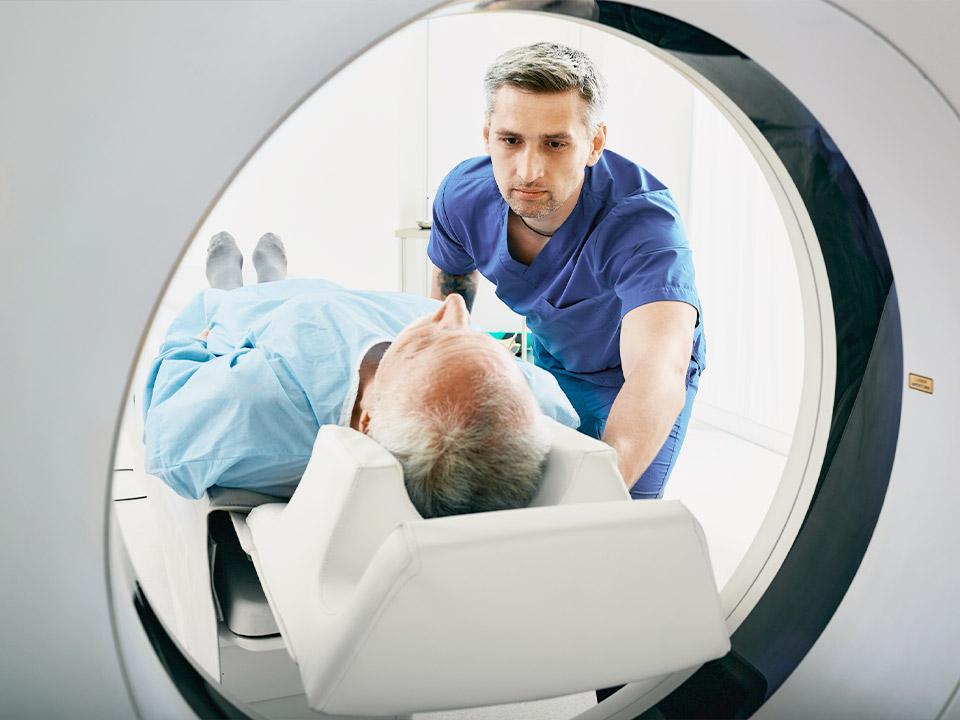Diagnostic Medical Imaging in Birmingham, AL
Clear Results You Can Trust at UAB Medical West Hospital

Diagnostic Medical Imaging; Take the First Step for a Better Tomorrow
At UAB Medical West, we know that diagnosing your illness is essential to your care plan. That is why we offer state-of-the-art imaging technology delivered by highly skilled and friendly staff. With medical imaging, our team of professionals can diagnose, assess, and monitor various conditions. Each year, we upgrade our diagnostic tools, staying at the forefront of medical imaging in our community. From a sprained ankle to sleep apnea and everything in between, the professionals at UAB Medical West use the diagnostic medical center to heal patients for a better tomorrow.
"*" indicates required fields
Our Diagnostic Medical Imaging Center
UAB Medical West Imaging Services is located on the hospital’s first floor. This location is wheelchair accessible and offer various parking options for your convenience. At UAB Medical West, you’ll find a variety of medical imaging technology to aid the diagnostic process.
After your initial appointment, your provider will direct you to the imaging center best suited for your needs. From there, you’ll be greeted by encouraging, dedicated staff who aim to make your testing experience comfortable and stress-free. If you have any questions throughout your visit, don’t hesitate to ask a staff member or call us at (205) 481-7155.
Medical Imaging Services at UAB Medical West Hospital
General Radiology refers to diagnostic exams that use x-rays to produce images of the body. Most X-ray exams take only a few minutes and are painless.
Computed Tomography (CT or CAT scan) is a medical imaging technique that combines conventional X-ray imaging with computer technology to produce images of the body. To prepare for a CT scan, you may be asked to refrain from eating or drinking starting six hours before the procedure. If necessary, you may take medications with a small amount of water. CT scans generally take 30-45 minutes. The scan will take longer if multiple images are generated, or a detailed study is needed.
Magnetic Resonance Imaging (MRI) is an advanced imaging technique that uses a magnetic field and radio waves to create images of the body. In most cases, there is no patient prep needed for an MRI. Should the exam require any prep, such as refraining from food or drink, the doctor will provide you with instructions. Before the imaging, you will be asked to remove any metal objects you may be wearing. It is recommended the patient wear clothing without metal zippers, snaps, or buttons. Patients with metal inside their bodies must inform the MRI technologist.
Ultrasound uses sound waves to produce images. This technology is typically used for obstetrics and gynecology, cardiology, urology, and many other medical specialties. Various ultrasound procedures require different preps. Consult your physician or contact our scheduling department for details. Ultrasound exams take an average of 20-30 minutes, depending on the area of the body being examined. This type of diagnostic imaging is painless with no side effects.
Digital mammography is a medical imaging technique specifically designed for breast tissue, and is a tool to screen for breast cancer. On the day of your exam, do not use any lotions, creams, perfumes, powders, or deodorant on or around the breast area, as these can appear on the image as calcium spots. No other prep is required.
Nuclear medicine uses the detection of energy emitted from a radioactive substance given to the patient, either intravenously or by mouth. It comprises diagnostic exams that result in images of body anatomy and function.
Vascular studies use sound waves, rather than radiation, to produce images. This includes arterial and venous studies to evaluate blockages that may lead to stroke. These studies also assist in determining peripheral vascular disease and blockages in the extremities. The UAB Medical West Vascular Lab is accredited by The Intersocietal Commission for the Accreditation of Vascular Laboratories (ICAVL).
Cardiac Catheterization is used for diagnostic matters of the heart. It may be utilized to obtain information about the heart and its blood vessels, provide treatment for certain types of heart conditions, or determine the need for heart surgery. The Cath Lab at UAB Medical West performs several diagnostic procedures to assess the condition of your cardiovascular system. Our procedures include Diagnostic Cardiac Catheterizations (also called cardiac cath), pacemaker implants, TEE, cardioversion, and other interventional radiologic procedures. The Cardiac Cath will reveal where blockages in the coronary arteries are located using fluoroscopy (X-ray) and contrast (dye).
The Sleep Center diagnoses and treats sleep problems such as insomnia, sleep apnea, and restless legs syndrome. The diagnostic process is easy, non-invasive, and in most cases, is covered by insurance.
Breast MRI uses advanced technology to produce highly detailed images of breast tissue, making it especially beneficial for women with dense breast tissue, a family history of breast cancer, or those at higher risk. Unlike traditional mammograms, Breast MRIs can detect abnormalities that may be missed by other screening methods-giving doctors more information, and giving you more peace of mind. Talk to your primary care provider or OB/GYN to find out if this advanced screening option should be part of your healthcare plan.